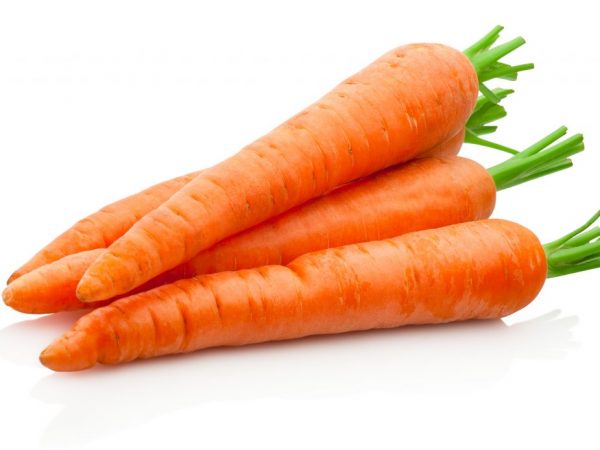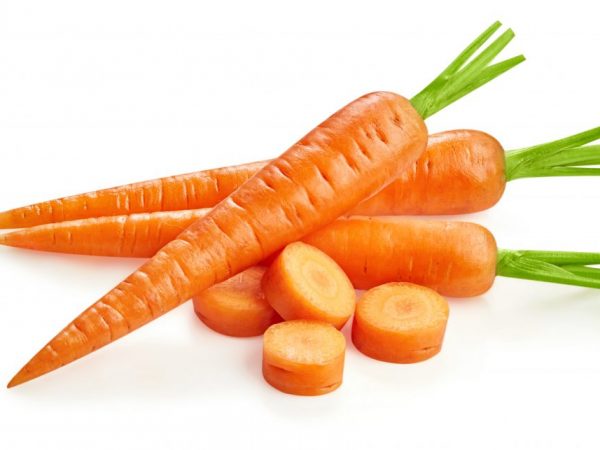Chemical composition and calorie content of carrots
Carrots are on the list of diet food leaders. The calorie content of carrots is low, while it has many useful properties.

Chemical composition and calorie content of carrots
Beneficial features
Carrots are the most commonly used ingredient in various dishes. The elements included in its structure are not destroyed during heat treatment. Therefore, this root vegetable is used in different forms, getting the maximum of useful properties.
Benefits for the human body:
- has a beneficial effect on the digestive tract, removes toxins and normalizes acidity;
- strengthens the walls of blood vessels, has a positive effect on the work of the heart muscle;
- some components help in the formation of blood cells and neutralize anemia;
- diuretic and choleretic functions, dissolves stones in the gallbladder, in the bladder and kidneys;
- enhances immunity;
- helps in the regeneration of the skin in wounds, heals the mucous membrane;
- strengthens nails, hair and gives a beautiful appearance to the skin, has anti-aging properties;
- carotene in the composition of the root vegetable creates a biological protection of the lens of the eye from the aggressive action of ultraviolet radiation.
It should be limited to people with stomach problems (ulcers), thyroid gland, diabetes mellitus (harmful by raising blood sugar levels, which should not be allowed with insulin treatment).
A contraindication is an allergic reaction to the product. Excessive consumption of vegetables is not allowed by healthy people, especially children - this threatens with carotenemia (a disease in which the body contains an excessive amount of carotene, which causes yellowing of the skin).
Composition of chemical elements
Carrots are a large vegetable group with more than 60 varieties found throughout the world, including Europe, Africa, Asia, Australia and America.
The composition of carrots contains the following chemical elements (per 100 g of product):
- vitamins of groups A (2000 μg), B (B1 -0.06 mg, B2 - 0.07 mg, B5 - 0.3 mg, B6 - 0.1 mg, B9 - 9 μg), C (5 mg), E (0.04 mg), PP (1.1 mg), H (0.06 μg), K (13.3 μg), beta-carotene (12 mg);
- macroelements - calcium (27 mg), magnesium (38 mg), potassium (200 mg), sodium (21 mg), chlorine (63 mg), phosphorus (55 mg), sulfur (6 mg); trace elements - iron (0, 65 mg), copper (82 μg), manganese (0.3 mg), iodine (5 μg), selenium (0.1 μg), chromium (3 μg), fluorine (55 μg), boron (200 μg), molybdenum (22 μg), cobalt (2.1 μg), lithium (6.2 μg), vanadium (99 μg), aluminum (326 μg);
- dietary fiber (2.4 g);
- ash (1 g);
- starch (0.2 g) organic acids (5 g);
- mono- and disaccharides (6.7 g);
- water (88 g).

The vegetable is rich in nutrients
In terms of the number of carotene compounds, the orange vegetable is ahead of many well-known products, with the exception of sea buckthorn. The daily norm is 100-200 g of fresh raw root vegetable, this is 1-2.5 pieces of medium size.
As part of carrots, except for chemical. elements, there are essential and fatty oils, anthocyanins, flavonoids, nonessential and essential acids, sterols and other elements.
Calorie count and energy balance
In addition to the necessary vitamin and mineral complexes, carrots contain proteins, fats and carbohydrates.At the same time, the carbohydrate part makes up most of the entire BJU index, therefore this product is ideal for obtaining energy.
Indexation of the ratio of BZHU in raw carrots - 16%: 17%: 67%. Calories, as well as the amount of proteins, fats and carbohydrates (KBZhU), change in accordance with which food components the root vegetable is combined with or which dishes it includes, as well as the way carrots are processed.
The calorie content of raw carrots is 37.28 kcal per 100 g, this portion releases 156 kJ of energy, proteins in this amount of raw materials occupy 1.49 g, fats - 0.19 g, carbohydrates - 7.01 g.
Carrot juice is less caloric - only 28 kcal, where proteins are 1.1 grams, fats are 0.1 grams, carbohydrates are 6.4 grams, and the energy value of fresh natural carrot juice reaches 132 kJ. In one frozen vegetable, the calorie content is kept at 37.5 kcal, food. value - 156 kJ, proteins in it 0.65 g, fats - 0.05 g, carbohydrates - 7, 6 g.
In broths, where fresh carrots, crushed on a grater with large or small holes, are used in their raw form, the indicators change somewhat. The calorie content of carrots with apples is 40.3 kcal, and the amount of proteins is 0.7 g, fats - 0.3 g, carbohydrates - 8.4 g.
The calorie content of raw grated carrots with the addition of honey is 54.9 g, proteins 1.3 g, fats - 0.1 g, carbohydrates - 13.1 g. The calorie content of raw carrots in a salad with fresh white cabbage is 50.2 kcal, including proteins - 1.5 g, fats - 1.7 g, carbohydrates - 7.2 g.
The calorie content of raw carrots, grated with sugar - 80.23 kilocalories, food. value - 335 kJ, proteins - 1.37 g, fats - 0.39 g, carbohydrates - 18.56 g.
A root vegetable, thermally processed in different dishes, also has characteristics that are distinctive from raw materials. Boiled carrots or steamed carrots are less calories - up to 25 kcal, have a protein content of 0.8 g, fat 0.3 g, carbohydrates 5 g. high-calorie carrots fried in oil will be much higher, while they will lose their main beneficial properties.
Conclusion
The orange root vegetable is nutritious, healthy, and rich in vitamins and minerals. Special dietary food for those who have weight problems, malfunction of internal organs or diabetes necessarily calculates how many calories are in carrots and BJU in dishes with carrots. Carrots are also recommended in cases of lack of vitamins in the body.

